How do you deliver consistent, scalable training to hundreds—or even thousands—of employees, partners, or customers? The answer lies in Enterprise Learning Management Systems (LMS).
Yet, according to industry research, the LMS market is expected to grow at a CAGR of 17.39% through 2030
In this guide, we’ll break down what an LMS is, explore its benefits, dive into the best enterprise learning options for 2025. Ready to take your organization’s learning to the next level? Let’s get started.
What is a Learning Management System (LMS)?
A Learning Management System is essentially your command center for training and education. It’s software designed to organize, deliver, and track learning materials—all in one place. Think of it as your digital university, but instead of ivy-covered walls, it’s tailored dashboards, course libraries, and progress reports.
For enterprises, an LMS is a powerhouse tool. Whether it’s onboarding new hires, rolling out compliance training, or empowering teams with new skills, these platforms simplify the learning process and help maintain consistency across the board.
The Best LMS for Enterprises
Finding the right LMS isn’t just about ticking boxes on a features list; it’s about matching the platform to your organization’s goals. The best LMS platforms deliver flexibility, scalability, and tools to measure success. They make learning not just a checkbox task but an engaging, transformative experience.
Benefits of Using an Enterprise Learning Management System
Why invest in an LMS? Simple: it’s a game-changer for both learners and organizations. For one, it saves time—no more juggling spreadsheets or outdated training manuals. An LMS also cuts costs by replacing expensive in-person sessions with virtual training. On top of that, employees get access to personalized, on-demand learning that fits their schedules, making training far more effective.
But the real magic happens when you look at the big picture: an LMS helps close skill gaps, drive productivity, and keep your team ahead of the curve. That’s not just good for employees—it’s great for business.
- Improved Training Efficiency: Centralized content and automated processes.
- Cost-Effectiveness: Virtual training reduces traditional training costs.
- Employee Engagement: Gamified and interactive content boosts participation.
- Scalability: Easily accommodates organizational growth.
- Better Compliance: Ensures training meets industry standards and regulations.
- Integrates AI-driven automation in certain instances.
Types of Enterprise LMS
Not all LMS platforms are created equal. Here’s a quick breakdown of the types you’ll encounter:
- Traditional LMS: These focus on internal employee training.
- Extended Enterprise LMS: Perfect for organizations that train external stakeholders like customers or partners.
- Cloud-Based LMS: Accessible anytime, anywhere, and scalable as you grow.
- On-Premises LMS: Installed locally for organizations that need full control (but it comes with more IT overhead).
Each type has its strengths, so your choice will depend on your specific needs.
The 15 Best Enterprise LMS Options for 2025
We know choosing an LMS can feel overwhelming, so we’ve done the homework for you. Here’s our curated list of the top platforms for 2025. (Stick around—we’ll go into more detail about each one below.)
LMS | Key Features | Best For | Pricing |
Whale | Simple interface, team collaboration | Small-to-mid-sized teams | Contact for pricing |
Docebo | AI-enhanced learning, integrations | Large enterprises | $25,000/year |
Absorb LMS | Content libraries, gamification | Upskilling and continuous training | Contact for pricing |
iSpring Learn | Interactive assessments, mobile learning | Corporate learning | $6.64/user/month |
ProProfs | 100+ Ready-to-Use Courses | Scalable enterprise programs | Contact for pricing |
Talent LMS | Gamification, white-label options | Partner training | Starts at $89/month |
Seismic Learning | Sales-focused training, skill gap analysis | Sales teams | Contact for pricing |
Tovuti LMS | Social learning, badges | Dynamic content delivery | $199/month (up to 50 users) |
EducateMe | Custom branding, reporting tools | Collaborative learning environments | Starts at $100/month |
Adobe Learning Manager | AI course creation, gamification | Creative industries using Adobe Cloud | Contact for pricing |
360Learning | Collaboration tools, peer learning | Medium-to-large organizations | $8/user/month |
Pluralsight | Skill-building courses | IT and development teams | Starts at $19/month |
Continu | Advanced segmentation, onboarding features | Continuous learning | Contact for pricing |
Academy Ocean | Adaptive learning, mobile app | Customer onboarding | Starts at $300/month |
Knolyx | Video options, compliance tools | Comprehensive training strategies | $628/month (up to 100 users) |
1. Whale
Whale serves as an advanced Enterprise Learning Management System that delivers tailored training experiences for employees, fostering professional development and organizational growth. Designed to facilitate seamless onboarding, compliance training, and skill enhancement, Whale integrates AI-driven automation to craft unique learning journeys for each role in your organization.
Key Features of Whale:
- Automated Training Flows: Customize learning paths using triggers, delays, and repeat actions.
- AI-Generated Quizzes: Ensure knowledge retention with tailored assessments.
- Certifications and Badges: Recognize and motivate employees with visible achievements.
- Mobile and QR Code Access: Empower remote and field teams with instant learning resources.
Best For
- Organizations seeking to streamline training processes with dynamic and automated learning solutions.
- Small-to-medium businesses focused on team alignment.
Pricing
- Free trial available.
- Paid plans start at $9/user/month.
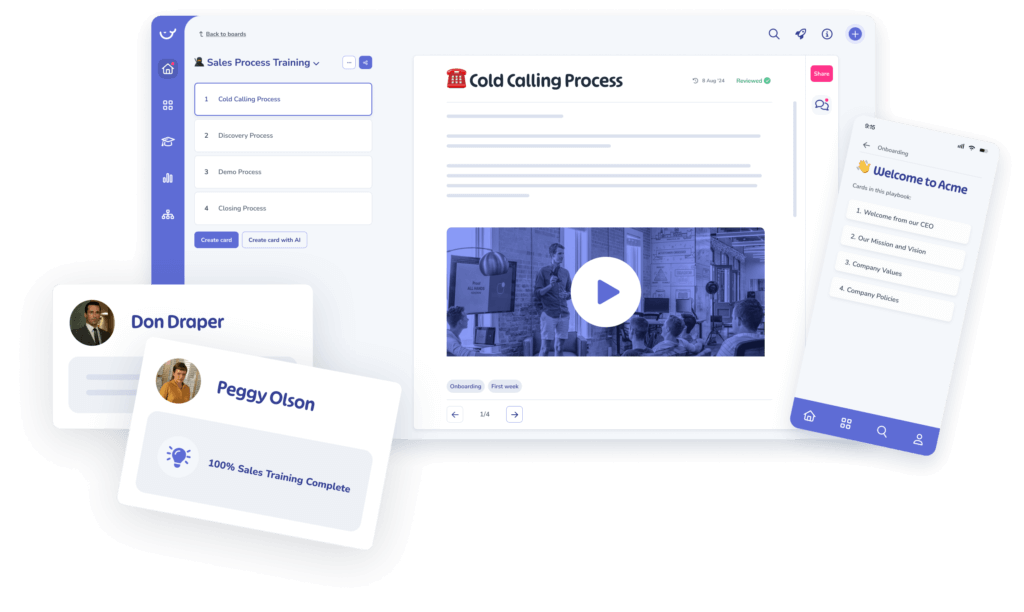
2. Docebo
A robust AI-powered LMS, Docebo offers automation for content creation and personalized learning paths. Its marketplace provides access to pre-built courses, making it ideal for large-scale enterprises aiming to streamline employee training and development.
Key Features
- AI tools for learning personalization
- Content marketplace integration
- Advanced analytics for ROI tracking
Best For
Enterprises needing scalable training systems with automation.
Pricing
Starts at $25,000/year.
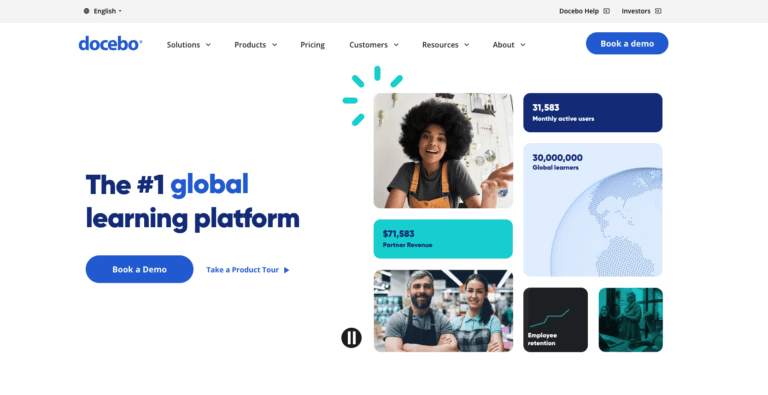
3. Absorb LMS
Absorb LMS combines flexibility with a comprehensive course library. It provides gamification, mobile learning, and strong integration with external content providers, catering to organizations with diverse upskilling needs.
Key Features
- Extensive pre-built course library
- Gamification and mobile learning tools
- SCORM-compliant content
Best For
Corporations with a focus on upskilling and continuous learning.
Pricing
Custom pricing; free trial available.
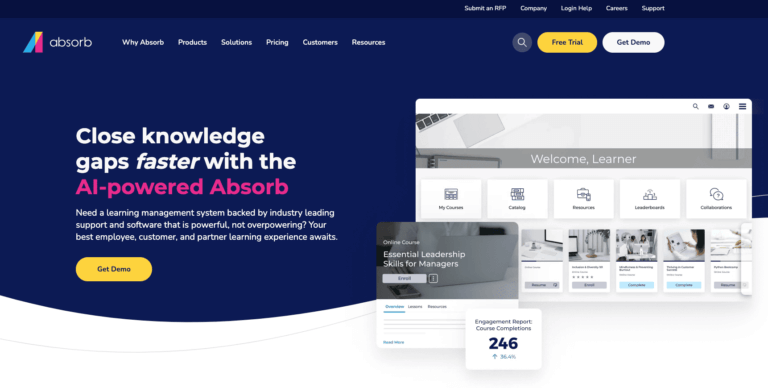
4. iSpring Learn
iSpring Learn is an accessible LMS tailored for interactive corporate training. With its built-in course authoring tools and focus on mobile compatibility, it enables organizations to create engaging learning experiences efficiently.
Key Features
- Interactive assessments
- Seamless mobile learning
- Integrated course creation
Best For
SMBs looking for simple, cost-effective training solutions.
Pricing
Starts at $6.64/user/month.
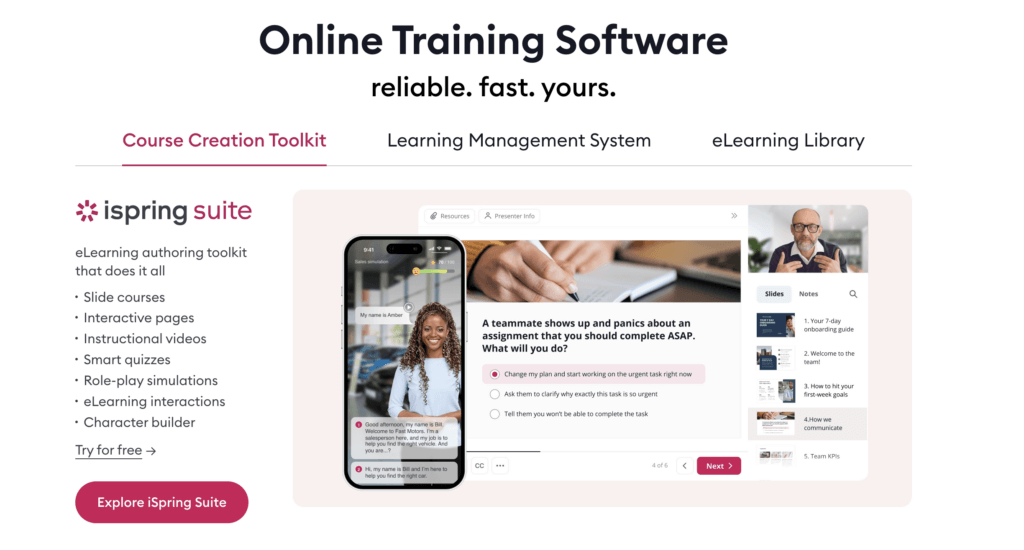
5. ProProfs Training Maker
ProProfs Training Maker is an enterprise-grade LMS that simplifies course creation, employee training, assessment, and tracking. The tool is comparatively easy to use and scalable, and being cloud-hosted, no downloading or installation is required.
Key Features
- Library of expert-taught courses
- Multiple instructors
- Mobile-readiness
Best For
Easy employee training for businesses of all sizes & across industries.
Pricing
Forever free for small teams
Paid plan starts at $1.99/active learner/month
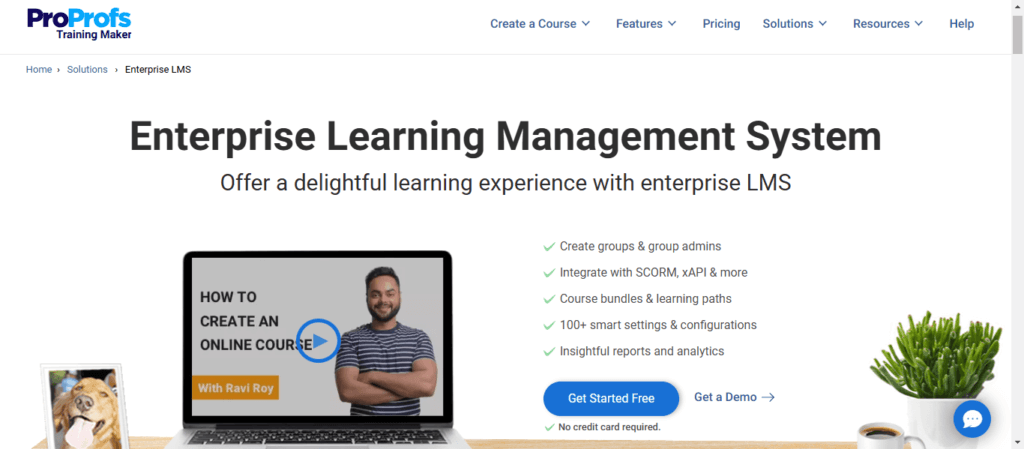
6. Talent LMS
A scalable LMS, Talent LMS excels in gamification and white-label options. It’s perfect for businesses looking to enhance partner or employee training through engaging and flexible content.
Key Features
- Gamification features
- White-label branding
- Branching and customization
Best For
Organizations focused on scalable partner and employee training.
Pricing
Starts at $89/month.
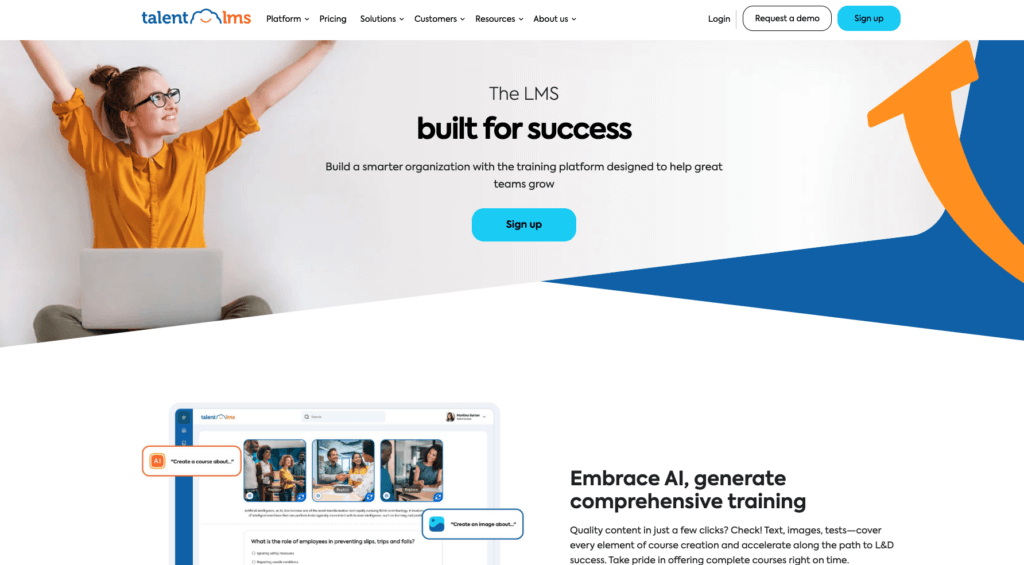
7. Seismic Learning (formerly Lessonly)
Seismic Learning targets sales enablement through tailored training paths and skill gap analysis. Its tools are designed to improve sales performance while also enhancing employee knowledge.
Key Features
- Skill gap analysis
- Sales-specific learning paths
- Progress tracking
Best For
Sales teams and performance-driven organizations.
Pricing
Custom pricing; contact for details.
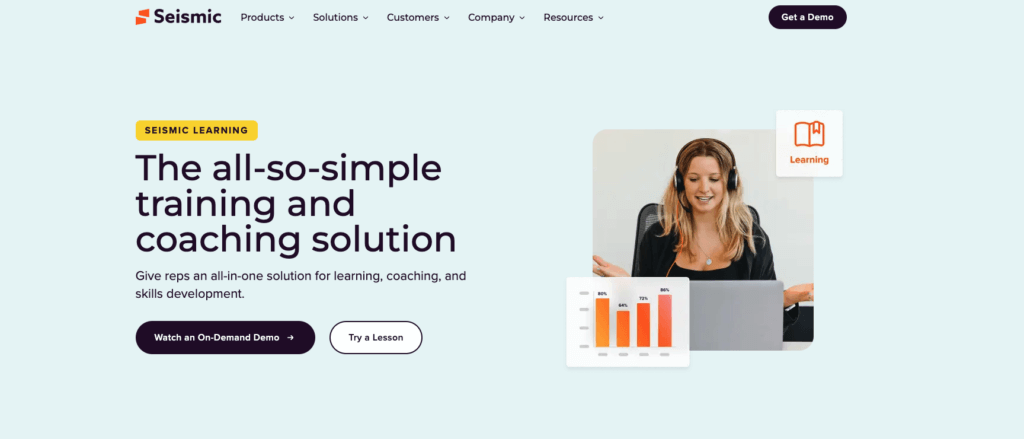
8. EducateMe
EducateMe blends collaboration with advanced analytics, offering enterprises tools for branded learning and comprehensive reporting. Its drag-and-drop editor simplifies course creation for diverse training programs.
Key Features
- Intuitive course creation
- Advanced reporting tools
- Collaborative learning environments
Best For
Organizations emphasizing collaboration and reporting.
Pricing
Starts at $100/month.
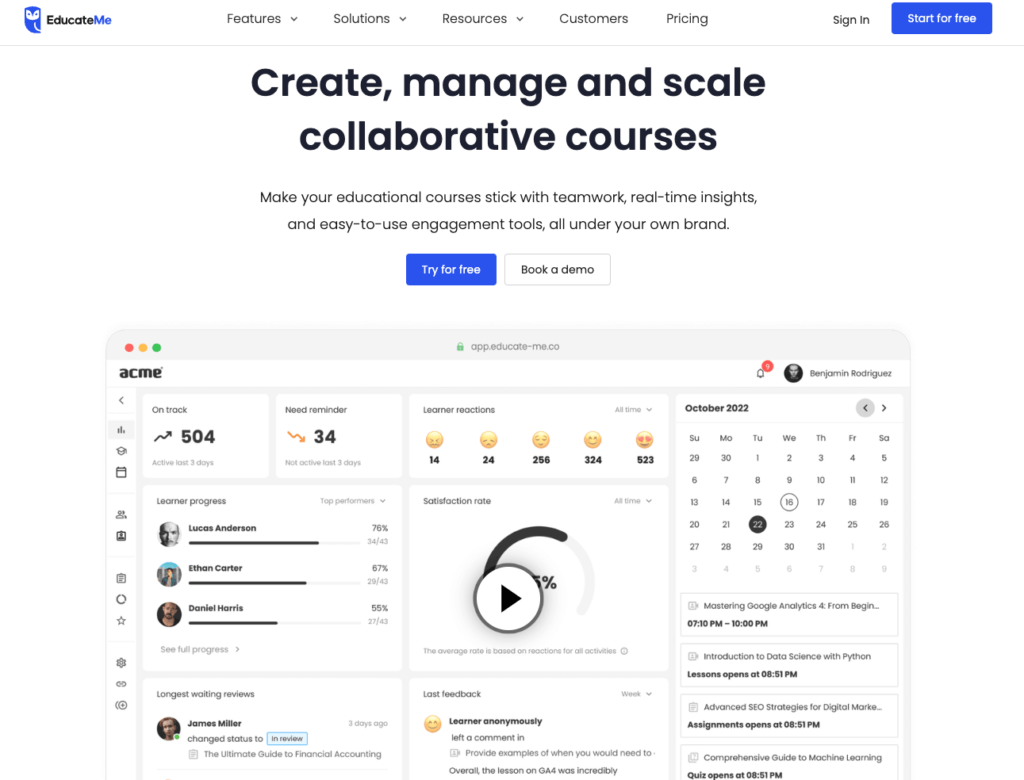
9. 360Learning
Focused on collaboration and peer learning, 360Learning supports team interaction through forums and comment threads. Its course builder and analytics make it ideal for fostering internal knowledge sharing.
Key Features
- Collaborative learning features
- Peer-to-peer knowledge sharing
- SCORM-compatible course builder
Best For
Mid-sized to large enterprises with a collaborative culture.
Pricing
Starts at $8/user/month.
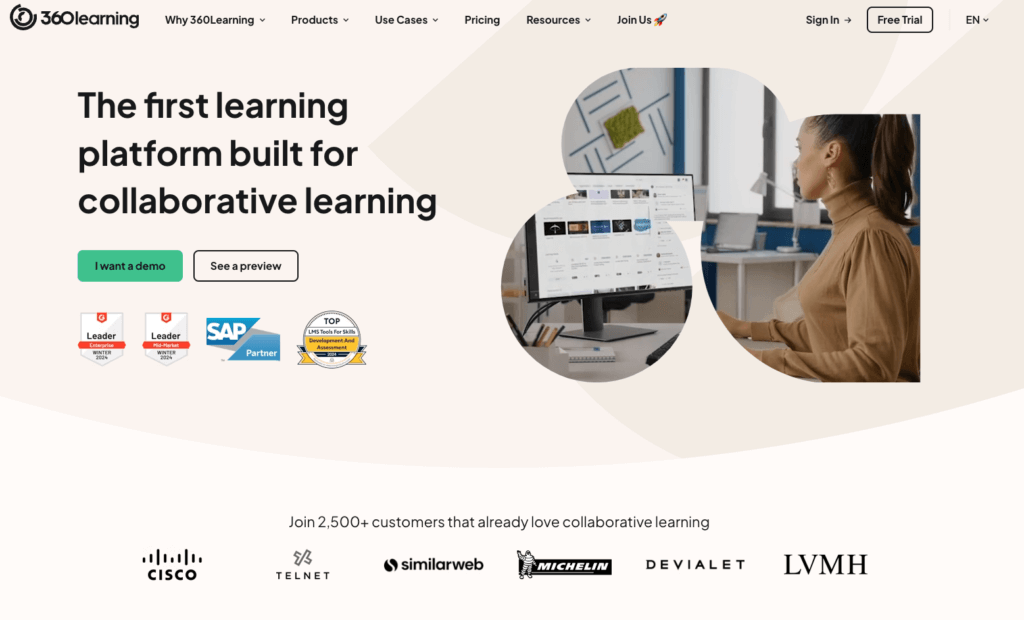
10. Tovuti LMS
Tovuti stands out with its focus on interactive and gamified training. Designed for dynamic learning environments, it supports SCORM compliance and offers a suite of social learning tools.
Key Features
- Gamification and certifications
- SCORM-compliant courses
- Social learning tools
Best For
Enterprises seeking interactive training programs.
Pricing
Starts at $199/month for up to 50 users.
11. Adobe Learning Manager
Adobe Learning Manager is an AI-powered LMS perfect for organizations already using Adobe products. It enables personalized learning experiences and seamless content creation through integration with the Adobe Cloud.
Key Features
- AI-driven course creation
- Creative content delivery
- Adobe Cloud integration
Best For
Creative teams and Adobe ecosystem users.
Pricing
Custom pricing; free trial available.
12. Pluralsight
Pluralsight specializes in IT and technical skill-building. With an extensive library and learning paths, it helps organizations upskill employees in high-demand tech roles.
Key Features
- Library of technical courses
- Skill assessments and analytics
- Pre-built learning paths
Best For
IT teams and technical training programs.
Pricing
Starts at $19/month for individuals; team plans at $33.25/month.
13. Continu
Continu is designed for onboarding and continuous learning. Its segmentation tools and CRM-like features make it a versatile choice for managing diverse training audiences.
Key Features
- Advanced segmentation tools
- CRM features for learner management
- eLearning authoring tools
Best For
Organizations focusing on onboarding and extended enterprise training.
Pricing
Custom pricing; contact for details.
14. Academy Ocean
Academy Ocean offers adaptive learning and customization options, making it a strong choice for customer onboarding and stakeholder training.
Key Features
- Adaptive learning features
- Mobile-friendly platform
- Comprehensive reporting
Best For
Enterprises managing diverse learner groups.
Pricing
Starts at $300/month.
15. Knolyx
Knolyx combines gamification, compliance, and collaboration tools to create a versatile learning platform. Its mobile app and simulations support diverse training scenarios.
Key Features
- Mobile-friendly learning
- Gamification and simulations
- Compliance management
Best For
Enterprises seeking a multi-functional LMS for varied training needs.
Pricing
Starts at $628/month for up to 100 users.
How to Choose the Right Enterprise Learning Management System
When evaluating your options, start with your goals. Are you training employees, partners, or customers? Do you need advanced analytics or just basic tracking? What’s your budget? These questions will narrow your choices and help you zero in on the perfect platform.
Follow this process to help you choose the best LMS for your business;
- Define Learning Objectives: Pinpoint training goals for internal or external audiences.
- Consider Scalability: Ensure the LMS accommodates organizational growth.
- Evaluate Features: Look for gamification, mobile compatibility, and robust analytics.
- Integration Capabilities: Choose an LMS that integrates seamlessly with CRMs, HCMs, or existing tools.
- User Experience: Prioritize intuitive interfaces for both administrators and learners.
Characteristics of the best LMS Platforms
- Ease of Use: Simple navigation and accessibility.
- Content Variety: Supports multimedia, SCORM, and interactive formats.
- Analytics: Detailed tracking and reporting.
- Collaboration: Tools like forums, peer reviews, and badges.
- Mobile Optimization: Accessible on all devices.
Why an LMS Is More Than Just Software
An LMS isn’t just about keeping up with training trends; it’s a powerful tool for transforming your workforce. Companies using LMS platforms report higher employee engagement, reduced turnover, and measurable boosts in productivity. And let’s not forget the savings—virtual training costs a fraction of in-person sessions
Get documenting & training NOW
FAQs about Enterprise Learning Management Systems (LMS)
What is an enterprise LMS?
An Enterprise Learning Management System is software that helps businesses train their teams at scale. It can also be used for external training with customers and partners.
What’s the difference between an LMS and an HCM?
An LMS focuses on training and education, while an HCM (Human Capital Management system) handles broader HR functions like payroll and recruitment.


